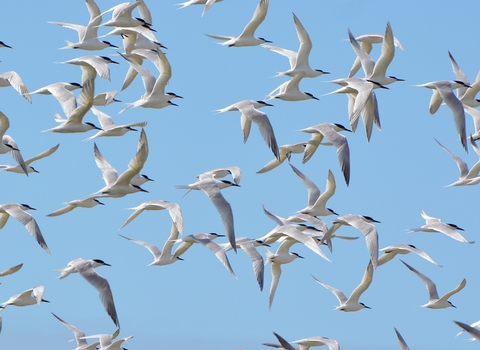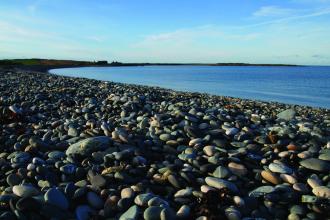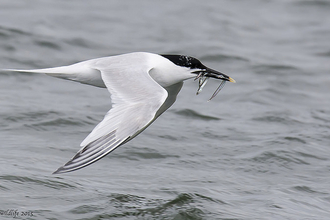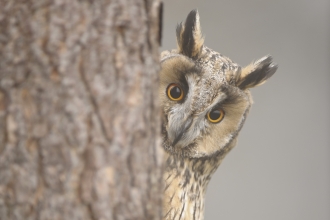Last updated 11th February 2025
DEFRA is describing the current risk of HPAI in wild birds as very high. This means outbreaks or occurrences of the disease are very likely to occur.
At Cemlyn and our other coastal nature reserves we will be keeping a close eye on the birds, reporting cases and arranging testing of dead birds as necessary. We continue to work with our colleagues in Natural Resources Wales and the Animal and Plant Health Agency in coordinating reporting and action against this disease.
However, we are asking our visitors at Cemlyn and all of our reserves to help us and please:
- Keep to the paths and not to disturb birds in any way.
- Keep dogs on leads and do not let them disturb any wildlife. Take all litter and dog poo home.
- Do not touch sick, injured or dying birds.
- If a dead bird is seen close to a public area, like a footpath, please report it via the links below.
2024 was a good season at Cemlyn following on from 2023, when the Cemlyn tern colony and the associated black-headed gulls were affected by HPAI, with adults and chicks of all species affected to a greater or lesser degree. The Sandwich tern colony was smaller than in recent years as well. You can read more about 2024 on our Discover terns at Cemlyn page.
In 2022 Cemlyn had a good season and many hundreds of chicks fledged but elsewhere outbreaks of avian flu had dramatic results. Certain tern colonies in The Netherlands (Den Noord) and France (Oye-Plage) lost up to 70% of their birds. In the UK, tern colonies on the east coast were hardest hit. The Isle of May and the Farne Islands were closed to the public and Coquet Island's tern colony was devastated, including a significant population of roseate terns. Breeding seabird colonies in Ireland did not seem to have been affected.
The bigger picture
Sadly, avian flu is a disease that is spread between wild birds and aquatic birds like gulls, ducks and geese are considered most at risk. We can’t stop this happening, but we can help our wild birds to be healthy and thrive, to withstand disease outbreaks like this. They already face pressures from habitat loss, pollution and a decline in insects and other food sources. It’s vital that we see stronger leadership on helping wild birds recover through a range of policy decisions. Entire UK populations of seabirds are at risk of being lost.
The current situation
DEFRA is describing the current risk of HPAI in wild birds as very high. This means outbreaks or occurrences of the disease are very likely to occur. In response to this threat, Defra and the Welsh Government have produced practical guidance to respond to the potential threat. The ‘Mitigation Strategy for Avian Influenza in Wild Birds in England and Wales’ sets out plans to mitigate the impact of avian influenza on wild bird populations whilst protecting public health, the wider environment and the rural economy. The most recent updates on the situation in Wales can be found here:
Avian influenza (bird flu): latest update | GOV.WALES
Regular updates are also produced by the UK government:
Bird flu (avian influenza): cases in wild birds - GOV.UK (www.gov.uk)
We are extremely worried about the impact that any outbreak could have on our already threatened wild bird populations at a time when we need to focus on building resilience in vulnerable populations through species recovery and conservation measures.
DEFRA Guidelines
Birds can be infected with the avian influenza virus through contact with infected individual birds or waste products. As well as domestic poultry, wild birds including waterfowl can carry and transmit the virus without showing evidence of disease. The movement of poultry around the globe, wild bird movement and migration are the main risks of transmission of the virus.
The risk of people contracting avian flu from wild birds is very low, but it is still recommended that sick or dead birds are not touched or picked up. Please check the latest guidance from DEFRA on reporting dead wild birds or ring the DEFRA helpline (03459 33 55 77).
Please visit DEFRA’s website for more details DEFRA
Welsh Government website: WALES
Impact on NWWT Conservation Work
As the national situation continues to evolve we have issued guidance to staff and volunteers on how to respond should they encounter dead birds. As part of our ongoing health and safety work we have updated and added to our guidance.
Feeding garden birds
It is currently recommend that bird feeders are cleaned weekly with an appropriate disinfectant and good personal hygiene is followed while doing this. There is further guidance on the BTO web site
Read more about what the Wildlife Trusts are calling for
- Government to develop a national strategy to help wild bird populations recover
- Effective monitoring, surveillance, research and reporting systems in place to build real-time understanding of the virus and its progress in wild birds
- Resilience built into vulnerable populations through recovery and conservation measures. This includes avoiding damaging development at sea and reduction of seabirds killed in bycatch
- Government to issue a moratorium on releasing large numbers of non-native gamebirds when avian flu is present across the country
- A new approach to poultry farming – intensive units that house thousands of hens and other domestic birds in barns are known to exacerbate the problem of contagious diseases, by providing ideal conditions for emerging pathogens to develop, which can then spread to wild birds
- More investment into how and why this is happening, to stand the best chance of avoiding similar tragedies in the future
- More resources for wildlife and nature charities to help with monitoring and tackling the problem
A blog from Joe Llanos at the Wildlife Trusts highlights avian flu as just another symptom of our ailing ecosystems:




